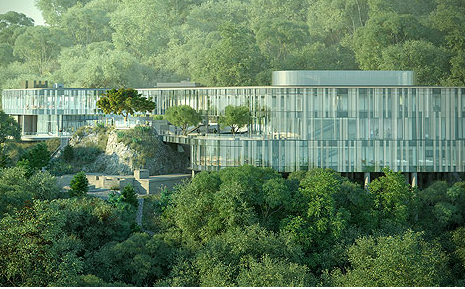
The University of Chicago is expanding its Asian presence with the construction of new education, research and collaboration hub in Hong Kong. The Hong Kong Jockey Club Charities Trust, a non-profit institution and Hong Kong’s largest community benefactor, has given a $30 million grant for the project. It adds to and complements the University’s centers in Beijing and Delhi, expanding the University’s work and engagement in China and Asia.
The new facility will be named the Francis and Rose Yuen Center in Hong Kong, in honor of University Trustee Francis Tin Fan Yuen, AB’75, and his wife, Rose Wai Man Lee Yuen, in recognition of their financial support of its construction, their dedication to the University’s global engagement and their long-standing commitment to the University’s work in Hong Kong and China. The announcement was made at an event Nov. 21 in Hong Kong.

Rendering courtesy of Bing Thom Architects
The Yuen Center is scheduled to open in 2018. It will house a collection of programs of the University of Chicago Booth School of Business, provide space and support for study abroad programs in the College, facilitate academic exchanges with regional partner institutions, and act as an intellectual home for faculty and student research, collaboration and engagement in Hong Kong, China and Asia. Booth’s programs at the Yuen Center will include the Booth Executive MBA Program Asia, as well as new and expanded programs on social innovation and entrepreneurship, which will strengthen Hong Kong’s social impact sector.
“The Yuen Center will be a home for education and research in the context of collaboration and engagement in Hong Kong, China and Asia, building upon the University’s rich history of scholarship in the region,” President Robert J. Zimmer said. “The generosity of the Hong Kong Jockey Club Charities Trust and Francis and Rose Yuen will allow for new opportunities for the University’s faculty and students and the contributions they can make through new education and research partnerships and programs in Hong Kong and China more generally.”
The University launched a center in Hong Kong at an interim facility last year, joining the Centers in Delhi, Beijing, London and Paris in bringing together researchers and students from across the University for interdisciplinary collaboration. The Yuen Center is an important addition to the University of Chicago’s international presence, which extends to hundreds of programs and initiatives in more than 40 countries, on all seven continents.
New partnership for a key region
The new center provides the University community and colleagues in the region with a broad base for collaboration in one of Asia’s most vibrant cities, while bringing new opportunities for social impact in Hong Kong. The Hong Kong Jockey Club Programme on Social Innovation, supported by the trust, will be operated by Booth’s Social Enterprise Initiative. The programme will offer a range of opportunities to enhance the social impact sector in Hong Kong and engage Booth students and alumni in Hong Kong and Asia. The social impact sector encompasses the businesses, nonprofits and government agencies that seek to solve social, environmental or cultural problems.
“The center will provide Chicago Booth with an important platform for deeper involvement in Asia,” said Douglas J. Skinner, interim dean of Booth and the Eric J. Gleacher Distinguished Service Professor of Accounting. “Not only will it serve as a base for existing programs in the region, most notably our executive MBA, but it will allow our faculty and students to engage more fully in a part of the world that is increasingly important to the global economy. We are excited about the important role our social programs will play in Hong Kong.”
The programme will strive to establish a social entrepreneurship and innovation platform to support collaboration in Hong Kong among local businesses, universities and the social service sector. It includes a series of scholarships and will host a variety of events and educational opportunities each year for social sector professionals, business members, and members of the local Hong Kong community.
“As Hong Kong’s largest community benefactor, the club has been a strong supporter of education for many years. The Club’s Charities Trust has in the past decade alone donated over HK$4.1 billion ($US526 million) in this area,” said Anthony W K Chow, deputy chairman of the Hong Kong Jockey Club. “This includes many projects in higher education, and most recently collaborations with such internationally recognized institutions as Oxford and Harvard universities and the Massachusetts Institute of Technology.”
Founded in 1884, the Hong Kong Jockey Club supports charitable and community projects through its Charities Trust.
Generous support for an intellectual destination
The Yuen Center is designed by internationally renowned Bing Thom Architects. Construction started in late June of this year. The hillside site was originally part of the Jubilee Battery in the late 1930s and 1940s, then a British Army Royal Engineers’ mess and quarters in the 1950s, and later a detention center.
The design weaves the Yuen Center into the contours of Mount Davis, suspending it above the historical site and touching down only at points of least intrusion. The design includes adaptive reuse of key heritage buildings as part of the Hong Kong Jockey Club Heritage Preservation Project. The public will be able to attend tours and exhibitions highlighting the history of the site and have access to hiking trails.
“The Yuen Center provides the University a strong connection to Hong Kong, its heritage and its citizens. We envision the center as a destination for learning and collaboration between the University and a wide array of institutions in Hong Kong and the region,” said Ka Yee Lee, professor of chemistry and senior associate vice president for research, who chairs the faculty advisory board of the center.
